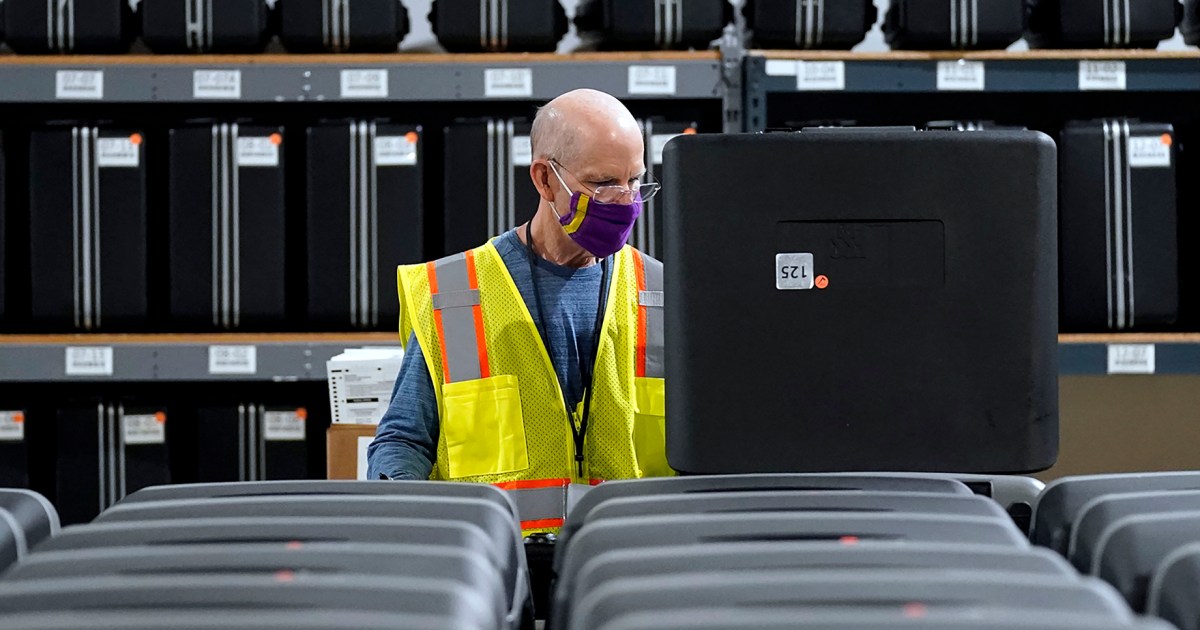
www.nbcnews.com
The Supreme Court case voting rights experts say could bring 'chaos' to elections
A Supreme Court case that will decide the power state legislatures wield over congressional and presidential elections could have far-reaching implications for
Politics
A Supreme Court case that will decide the power state legislatures wield over congressional and presidential elections could have far-reaching implications for American democracy, some voting rights experts said.
The Supreme Court said Thursday it would take up a North Carolina case that centers on whether the state's Republican-led Legislature is the only entity that can set the rules for federal elections.
That argument is often referred to as the independent state legislature doctrine, a legal theory that says only state legislators have the authority to set rules for federal elections. Some conservatives have advanced that position in recent years, pointing to a provision in the U.S. Constitution that says the manner of federal elections “shall be prescribed in each State by the Legislature thereof.”
State courts currently have the power to step in if they determine that state legislatures' election rules violate the state constitution or other laws, making them a powerful check and balance on partisan legislatures. Allies of former President Donald Trump made such claims in disputes over the 2020 election, and while state and federal courts largely shot them down, at least four Supreme Court justices have signaled an interest.
While the Supreme Court could take a wide range of actions in the North Carolina case, experts and voting rights advocates say a full-throated endorsement of the independent state legislature theory by a court that has a 6-3 conservative majority could roll back limits on partisan gerrymandering, unwind voter-implemented changes like ranked-choice voting and gut voter protections against discrimination found in state constitutions and more.
Such a ruling would put state election codes and congressional redistricting plans entirely in the hands of partisan state legislatures, many of which have been repeatedly criticized by state courts and others for aggressively gerrymandering and enacting restrictive voting laws.
“We think this is a dangerous notion and it would bring chaos to our election laws were it to be upheld," Michael Waldman, president of the Brennan Center for Justice at New York University, told reporters shortly after the court said it would take up the case. "It would be an extraordinary power grab by political actors were it to be upheld, and it would make it much, much harder or impossible for state courts to uphold voting rights, to combat gerrymandering, and otherwise to uphold the rights of citizens in our elections."
It could be “one of of the most significant, if one of the most destructive cases on American democracy,” said Waldman, whose organization advocates for more expansive voting access rules and regularly files lawsuits challenging policies it sees as discriminatory or suppressive.
The case in question centers on North Carolina Republican legislators' argument that they should be able to draw the state's congressional redistricting maps however they choose. The state Supreme Court said Republicans had "systematically" made it harder for Democrats to elect members of their choosing and barred the Legislature from using its preferred map.
"They’re essentially looking for a blank check to continue partisan gerrymandering," Tom Wolf, deputy director of the democracy program at the Brennan Center for Justice, told reporters after the ruling.
The Supreme Court declined to curb partisan gerrymandering in North Carolina and other states in a 2019 ruling, but in recent years state courts have intervened, particularly in states where voters have amended state constitutions to restrict gerrymandering.
Using ballot initiatives, voters have enacted new rules and procedures for redistricting in states including Michigan, Ohio, New York, Colorado, Missouri, Florida and Utah.
























































